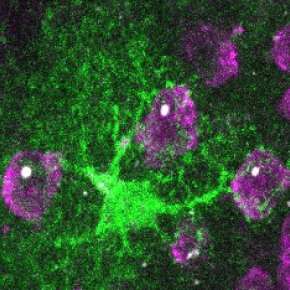In Huntington's disease, astrocytes cooperate with neurons in the brain

Huntington's disease is caused by a mutation in the Huntingtin gene, a protein necessary for the proper functioning of several brain cells. Mutated, it is no longer able to perform properly: it can even become toxic for the neurons, triggering a defense mechanism in the brain. In turn, the astrocytes, the neurons' support cells, change their behavior and become "reactive."
These reactive astrocytes were traditionally considered as being deleterious to the brain because they aggravate the symptoms of other brain diseases, such as Alzheimer's. However, in a recent study published in the journal Brain on 17 March 2022, a research team led by a CNRS researcher, revealed that stimulating the formation of reactive astrocytes in mouse models promotes the elimination of the mutated protein by reducing the quantity and size of its aggregates.
These results show that reactive astrocytes actually cooperate with neurons in Huntington's disease. The researchers now want to identify how to selectively stimulate these reactive astrocytes, paving the way for possible treatments.
More information: Laurene Abjean et al, Reactive astrocytes promote proteostasis in Huntington's disease through the JAK2-STAT3 pathway, Brain (2022). DOI: 10.1093/brain/awac068


















